 MyDogBreeds
MyDogBreeds Pudelpointer is originated from Germany but Beagle-Harrier is originated from France. Pudelpointer may grow 18 cm / 8 inches higher than Beagle-Harrier. Both Pudelpointer and Beagle-Harrier are having almost same weight. Both Pudelpointer and Beagle-Harrier has almost same life span. Both Pudelpointer and Beagle-Harrier has almost same litter size. Pudelpointer requires Low maintenance. But Beagle-Harrier requires Moderate maintenance
Pudelpointer is originated from Germany but Beagle-Harrier is originated from France. Pudelpointer may grow 18 cm / 8 inches higher than Beagle-Harrier. Both Pudelpointer and Beagle-Harrier are having almost same weight. Both Pudelpointer and Beagle-Harrier has almost same life span. Both Pudelpointer and Beagle-Harrier has almost same litter size. Pudelpointer requires Low maintenance. But Beagle-Harrier requires Moderate maintenance
 The Pudelpointer is cross between the Poodle and the English Pointer. The first Pudelpointer was bred in 1881 by Baron Von Zedlitz in Germany.
The Pudelpointer is cross between the Poodle and the English Pointer. The first Pudelpointer was bred in 1881 by Baron Von Zedlitz in Germany.
The idea was to bring about a gun dog highly skilled in tracking and retrieving. The Pudelpointer was introduced to North America in 1956, and in 1977 the Pudelpointer Club of North America was established.
Because breeders have avoided recognition by the American Kennel Club, the Pudelpointer never became a well known breed in the United States.
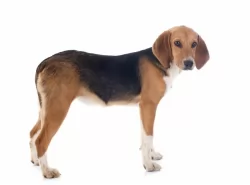 The Beagle Harrier, the breed that was made mixing the France Scent Hounds and a Beagle.
It is not quite sure if this breed was made on purpose or the mix of the breeds happened and resulted in a great dog so the breeding continued.
Since they are not large dogs as hounds, they are used to hunt small animals.
The Beagle Harrier, the breed that was made mixing the France Scent Hounds and a Beagle.
It is not quite sure if this breed was made on purpose or the mix of the breeds happened and resulted in a great dog so the breeding continued.
Since they are not large dogs as hounds, they are used to hunt small animals.
This first breeding took place in England, but after the 14th century, they were breed on purpose in France.
 The Pudelpointer stands at between 55 and 68cm in height and weighs between 20 and 30kg. He is a medium sized dog with a weather resistant, double-layered coat. The coat doesn’t shed much and is usually a brown, chestnut, liver or black color.
The Pudelpointer stands at between 55 and 68cm in height and weighs between 20 and 30kg. He is a medium sized dog with a weather resistant, double-layered coat. The coat doesn’t shed much and is usually a brown, chestnut, liver or black color.
The coat is usually dense, harsh and wiry. They have floppy ears with quite a unique feature - the mustache on the muzzle. The tail is docked, with about 30% being removed, giving the dog an attractive, distinctive look.
Full of energy, the lively Pudelpointer will love to find himself in a family where they are active, outdoorsy types. He loves water too, and when out on a hike, if there’s water around, he’ll be the first to jump right in.
He’s an intelligent dog too, eager to please and ready to learn. He can easily be trained and socialized. He is loyal, calm and loving and will get on well around children and other animals in the home. He is also protective and makes a good watchdog.
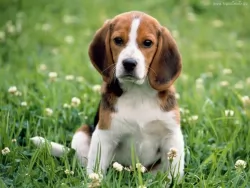 The Beagle Harrier is a scent hound that is described as a big sized Beagle or a small sized Harrier. This breed was developed from this two breeds, actually. Despite the looks of these breeds, the Beagle Harrier is an energetic kind of dog who gets very attached to his family. This medium sized pet comes in variations of colours and they are usually tricoloured. They usually have dark coloured eyes, white paws, and They usually grow up to have a very muscular body, but, if you don’t provide them with the daily activity they need, they will quickly get obese and unhappy.
The Beagle Harrier is a scent hound that is described as a big sized Beagle or a small sized Harrier. This breed was developed from this two breeds, actually. Despite the looks of these breeds, the Beagle Harrier is an energetic kind of dog who gets very attached to his family. This medium sized pet comes in variations of colours and they are usually tricoloured. They usually have dark coloured eyes, white paws, and They usually grow up to have a very muscular body, but, if you don’t provide them with the daily activity they need, they will quickly get obese and unhappy.
 The Pudelpointer may well be a gun dog but when it comes to his human family he is a social, loving companion.
The Pudelpointer may well be a gun dog but when it comes to his human family he is a social, loving companion.
He is intelligent too and can be easily trained. When at home with his human family, he is calm and content. He will however need lots of exercise and mental stimulation. In exchange for your love and care, he will be a good watchdog, protector, pet and friend.
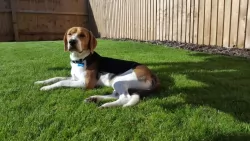 The Beagle Harrier, if trained properly and socialized while he was still a pup, will be the great playmate for any child. They get along with strangers, as well. We might say that they will get along with anybody who is ready to run and play with him. Children are most likely that kind of playdate, so it appears that they like children more. The Beagle Harrier is a great family pet, and he is great with babies, toddlers, teenagers… so don’t be afraid to leave the dog alone during the playdate!
The Beagle Harrier, if trained properly and socialized while he was still a pup, will be the great playmate for any child. They get along with strangers, as well. We might say that they will get along with anybody who is ready to run and play with him. Children are most likely that kind of playdate, so it appears that they like children more. The Beagle Harrier is a great family pet, and he is great with babies, toddlers, teenagers… so don’t be afraid to leave the dog alone during the playdate!
hunting, scent tracking, search dog
Some will say that the Beagle Harrier is one of the most desirable pets because of his loving and lively nature. They get along with almost anyone and they don’t mind living indoors if you have the time to take him out for a daily run each day. They will do great in a large group of people and any public places so you can take your Beagle Harrier with you anywhere you go.
Since the Beagle Harrier is placed in a group of the hound dogs, you must be aware that he will have the attitude of the pack leader. Once you got the Beagle Harrier puppy, you must start training and socializing him in order to grow the pet that will be easy to handle and accepted by the family and all the people around you, even strangers. They are very intelligent and they have a calm nature so they will be quite easy to train.
 The Pudelpointer is active and healthy and can live up to 14 years and maybe even longer with good care.
The Pudelpointer is active and healthy and can live up to 14 years and maybe even longer with good care.
Owners will do well to know about a couple of the common dog illnesses that can strike at any time -
Some dogs are more at risk for bloating. Larger dogs with deep chests are at greater risk. To help with preventing this deadly ailment, feed your dog a couple of smaller meals a day instead of one big meal that he gobbles up quickly.
Bloat is a medical condition which comes about with a rapid accumulation of gas in the stomach. Canine bloat or gastric dilatation and volvulus is a killer disease. The accumulation of gas can cause the stomach to twist and the dog can go into shock.
Your dog will be trying to vomit, he’ll be panting and pacing, drooling with a hard, swollen stomach.
This is a common illness or condition seen in many dogs, young and old, large and small.It’s a disease which can lead to pain, arthritis and lameness.
The Pudelpointer has floppy ears and loves swimming. The floppy ears are at risk for developing ear infections. Check inside the ears that they aren’t red or have a discharge. Your dog will be scratching his ears a lot.
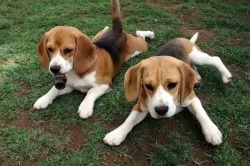 Almost every active dog suffers from joint diseases. Even though it’s generally a genetic disease, you can lower the chances of hip or elbow dysplasia by taking care of your dog’s weight, diet and daily exercise.
Almost every active dog suffers from joint diseases. Even though it’s generally a genetic disease, you can lower the chances of hip or elbow dysplasia by taking care of your dog’s weight, diet and daily exercise.
The Beagle Harrier has big ears that are always set down. That makes them ideal for the dirt accumulation, ear irritations and ear infections. Check his ears regularly and clean them at least once a week.
 Brush your PudelPointer twice a week to get rid of loose hairs.
Brush your PudelPointer twice a week to get rid of loose hairs.
Grooming can be an awesome bonding experience for you and your dog. While you’re brushing him, check him over for any unusual lumps.
Trim the nails if they don’t wear down naturally themselves.
Check inside the mouth for rotting teeth which can be a source of pain and lot of diseases in the body.
Exercise is very important and can come in the form of a walk every day or hikes, swimming as well as ball- and rope games and hide-and-seek.
Provide your dog with a nice warm, comfortable place to sleep.
Your PudelPointer can get to 14 years of age with good food. While you do get some excellent commercially manufactured dog foods, you want to be sure your pet gets some nutritious home-made food too.
Make sure that the kibble is the high quality ones with lots of vitamins and minerals. Boiled chicken, brown rice or pasta and spinach, sweet potatoes and carrots are a healthy choice for your pet – plain and simply just like dogs love it. Chop it up and add it into the dry kibble a couple of times a week.
Some raw meat added in from time to time will help his skin and coat remain healthy. Never leave him without a constant source of fresh, cool water.
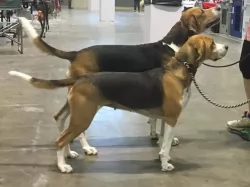 Since the Beagle Harrier is an active dog breed, they will need food for the active dogs. Make sure you provide them with quality food that will give them enough strength to get through the very active day, and not gain too much of the weight. It is very important that you don’t overfeed him because this breed quickly becomes obese. It is advisable to use treats while you train him to do new tricks, but be very careful with the amount you give to the dog.
Since the Beagle Harrier is an active dog breed, they will need food for the active dogs. Make sure you provide them with quality food that will give them enough strength to get through the very active day, and not gain too much of the weight. It is very important that you don’t overfeed him because this breed quickly becomes obese. It is advisable to use treats while you train him to do new tricks, but be very careful with the amount you give to the dog.
Puppies need to be fed only two times a day. Once you decide which brand of food you will use, stick with them until the dog is 6 months old. Make sure they have enough nutrients and the quality ingredients that will help them with growing strong and healthy bones.
If you want Beagle Harrier to grow up in a happy and healthy dog, make sure you provide him with quality food, lots of exercises and unconditional love. They are extremely loving and they get depressed if left alone. Grooming tips are very clear – they need a regular brush because shed a lot. The more you brush, the less hair you will find on your hands during the belly rubs.
If your Beagle Harrier is trained and socialized, the dog park will be the best daily activity for him. If there is no dog park near your house, take him to the bike ride, jogging, swimming, hiking, markets, parks… They love to be off the leash and with people but since they are the hound dogs, don’t be surprised if they get distracted by smelling something more interesting than the ball. They would love to grow up in a house with a large yard, but, if you live in the apartment, make sure that you take time for his daily activity.